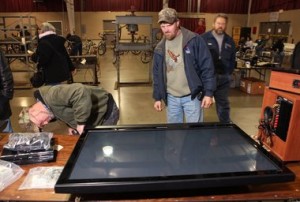 The federal government is regularly accumulating a number of precious items, which include a variety of real property, vehicles, jewellery, electronic products, appliances, and many others. The government acquire these items due to various reasons such as foreclosures, seizures, surplus and retrieval and collects them in a short period of time, making these items more expensive and difficult to store. So, instead of storing these accumulated items, the government sells them at auctions.
The federal government is regularly accumulating a number of precious items, which include a variety of real property, vehicles, jewellery, electronic products, appliances, and many others. The government acquire these items due to various reasons such as foreclosures, seizures, surplus and retrieval and collects them in a short period of time, making these items more expensive and difficult to store. So, instead of storing these accumulated items, the government sells them at auctions.
Government surplus auctions are among the nation’s largest form of auctions where the government sells unwanted property to eliminate storage and maintenance duties. So, where do small business owners come in?
While there is a variety of financial resources that can help entrepreneurs seek funds, such as research grants, small business grants for women, business grants for veterans, and bonding and venture capital programs all administered by the U.S. Small Business Administration (SBA), these types of financial assistance are often geared for something else. How about financing your office equipment, you wonder.
Small businesses often have insufficient funds to purchase additional supplies and equipment. Government surplus goods can be an easy and affordable way to equip your startup or business expansion. Just about anything your business might need is being sold by the government at these surplus auctions at reduced prices or fair market value. You can purchase computers, medical equipment, vehicles or even a piece of property for your office at a reasonable cost.
When federal or state agencies has an overflow of items consisting seized goods, foreclosures and equipment, these items are either sold to the public or transferred to another government agency. These items are auctioned “as is” in-person or online. Online auctions work similarly like other auction sites such as eBay or eBid.
However, there’s no sole online auction website that is being operated by the federal government. Federal agencies, such as General Services Administration (GSA) or Department of Defense (DoD), have their own auction sites for excess goods. Federal law enforcement agencies also manage auction sites featuring seized property.
Check out the following websites that provide government surplus goods and real estate for sale:
Auction sites
This site is designed to help auction bidders and property seekers find everything they need (including small business owners). It files most surplus goods and real property for sale by the federal government, from commercial buildings to furniture, office equipment to computers.
Featuring surplus property obtained from U.S. military services, and sold by the DoD’s Reutilization and Marketing Service. Items include appliances, vehicles, furniture, camping gear, computers, office equipment and radios.
Sells seized property by the federal law enforcement agencies. The property can be residential or commercial, and can be business establishments. It also sells personal property such as art and antiques, motor vehicles, collectibles, boats and art.
U.S. Treasury – Seized Vehicles
Has a record of seized vehicles auctions and sales that occur in various states. U.S. Treasury seized vehicles are often offered for sale at these areas: Miami/Ft. Lauderdale, Florida; Edison, New Jersey; Los Angeles, California; El Paso, Texas; Nogales, Arizona; and Chula Vista, California auction sales centers.
It offers IRS-seized properties due to tax defaults at auctions.
One of the leading online real estate auction websites, it features heaps of forfeited, tax-defaulted, and surplus properties. It offers single family home auctions and multi-family home auctions, developed and raw land auctions, and commercial property auctions on a reduced real estate market value across the country. Federal, state and local government agencies that sell items on the site include U.S. Dept. of Treasury, U.S. Marshall Service, U.S. Department of Energy, the State of New Jersey and more than 40 counties from coast-to-coast.
